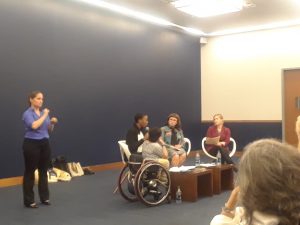The Biden Administration has proposed a new asylum-seeking policy that critics have dubbed an “asylum ban” because, if implemented, it would effectively bar thousands of migrants from seeking asylum in the United States. However, there is still time to take action to stop this disastrous policy from going into effect.
A key piece of the proposal is its third-country transit ban. This means that the United States will no longer consider asylum claims from migrants who set foot in another country between their nation of origin and the United States unless they unsuccessfully seek asylum in each country they pass through. For example, a migrant from Guatemala who travels through Mexico to reach the U.S./Mexico border would not be considered for asylum in the United States if they do not first unsuccessfully seek asylum in Mexico. This is an especially alarming announcement considering that, as of November, over 75% of migrants at the southern border were originally from countries other than Mexico.
Beyond that, the proposed policy includes a “rebuttable presumption” that all migrants are ineligible for asylum in the United States. The only pathway for migrants to rebut this inhumane presumption would be through scheduling an appointment to make their case for asylum through the CBP One app.
U.S. Customs & Border Protection launched CBP One in October 2022. Through the app, migrants can schedule appointments to apply for asylum at a designated port of entry. CBP One serves as a loophole to metering, an illegal practice in which migrants are forced to wait to seek asylum after physically arriving at a U.S. border. The number of appointments available each day through CBP One is shockingly limited compared to the number of migrants at the border hoping to request asylum. Each morning, the available appointments fill up within minutes, and even after a long and dangerous wait for an appointment, there is no guarantee that the United States will grant their asylum requests.
Currently, the U.S. government requires asylum-seekers from Haiti, Nicaragua, Venezuela, and Cuba to use CBP One, and the app is the main tool migrants use to seek exemptions to Title 42, the Trump-era policy restricting asylum due to alleged public health concerns. After Title 42 lifts on May 11th, if the Biden administration implements its new policy, CBP One will be the only route through which migrants could seek asylum.
Reliance on CBP One presents a slew of barriers to seeking asylum, not the least being the requirement of a functional smartphone and Internet access to use the app in the first place. Further, migrants have reported that the app itself is quite buggy. One of the most common problems has to do with the app’s facial recognition technology. The app requires all users to take a photo of themselves each time they attempt to schedule an appointment, but often fails to recognize faces of people with darker skin or Indigenous features. This makes certain groups of people, such as Haitians, less likely to get appointments.
CBP One is also currently only available in English, Spanish, and Haitian Creole. This presents potential barriers to Indigenous asylum-seekers who may not be familiar with the basics of any of those languages, let alone the legal jargon required to navigate the app.
The app also does not allow for families to schedule appointments as a single unit; each person must schedule an individual appointment. This practice has resulted in heart-wrenching cases of family separation, in which parents have had to send their children away or leave their children behind to seek asylum, with no guarantee of ever being reunited.
The reasons listed above just scratch the surface of the atrocities that have already taken place since the launch of CBP One and the horrors that will inevitably take place should the administration’s proposed policy go into effect. However, there is still some time left to take action.
Vocal, visible public opposition to the proposed policy is imperative. The proposal is currently in its public comment period, which will expire on March 27th. During this period, any member of the public can submit a statement with their thoughts on the proposed policy. The government cannot move forward with their policy until they have read, considered, and responded to every unique fact-based comment, and public comments have caused the federal government to reconsider policies before. Many human rights and immigrant justice organizations, such as HIAS, have released statement templates that people can use to submit unique substantive comments in under five minutes.
The HIAS template can be found here. All you need to do is enter your name, email address, zip code, and a couple additional sentences to the statement to make your comment unique. This could be anything related to the policy. If you struggle to come up with something to say, consider the question “Why is migrant justice important to you?” Maybe you have a personal connection to the asylum-seeking process. Maybe you’re studying immigration law. Maybe you live near the border and the proposed policy directly affects your community. Whatever you write, just make sure it’s unique.
Once you’ve finished filling out your comment, send the form directly to anyone you know who might respond—friends, family members, professors—anyone with a heart, five minutes, and access to the Internet.
Seeking asylum is a human right, and the U.S. government is on the verge of committing one of its most brutal violations of that right, threatening the lives of thousands of people seeking safety. It is our moral responsibility to speak out against the Biden administration’s proposal to prevent it from going into effect—and to do so before the public comment period expires on March 27th.






The proposed asylum ban by the Biden administration is deeply concerning, especially for those who believe in human rights and the U.S.’s legacy as a place of refuge. This article highlights the urgency of pushing back against policies that would make it even harder for asylum seekers to find safety.
For decades, the U.S. has been a nation that, at least in principle, welcomes those fleeing persecution, violence, and political instability. However, restrictive asylum measures only worsen humanitarian crises rather than solve them. Many of the people seeking asylum are escaping conditions most of us can’t even imagine—war, state oppression, and extreme poverty. Denying them a fair chance at protection goes against the very values the U.S. claims to uphold.
Rather than further criminalizing asylum seekers or imposing harsh restrictions, the focus should be on strengthening due process, expanding legal pathways, and addressing the root causes of migration. Seeking asylum is not a crime, and policies should reflect compassion and fairness rather than deterrence. The fight against this asylum ban is not just about policy—it’s about defending human dignity and ensuring that the U.S. remains a beacon of hope.